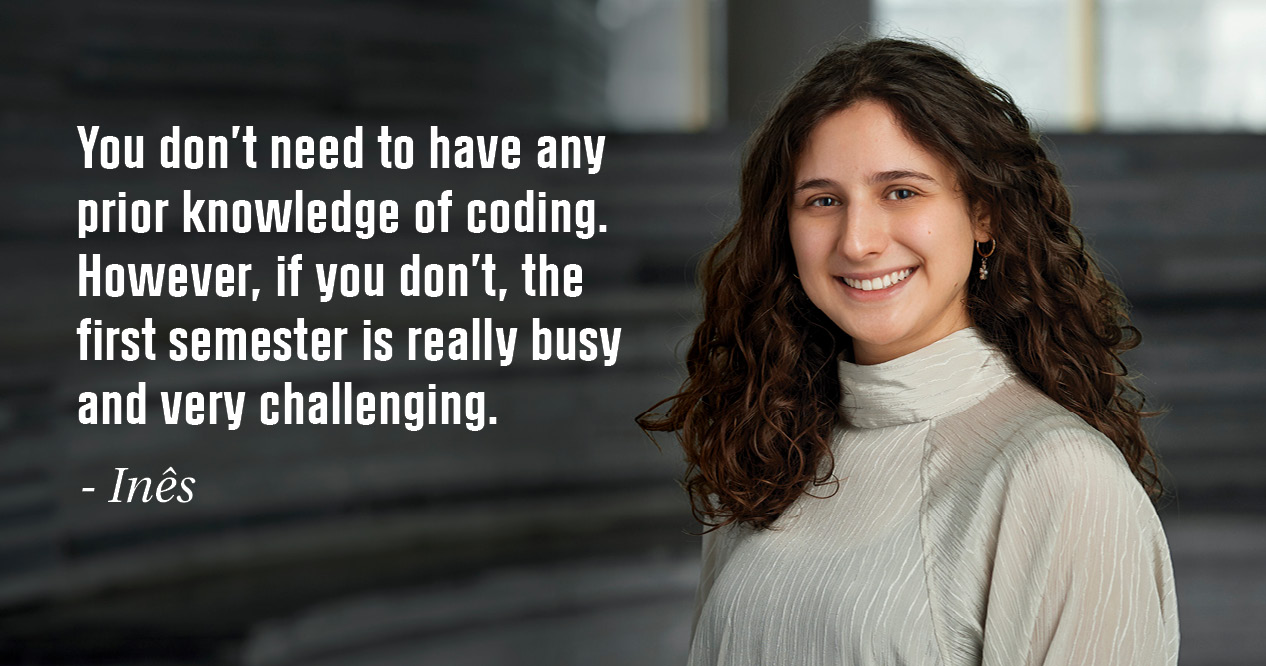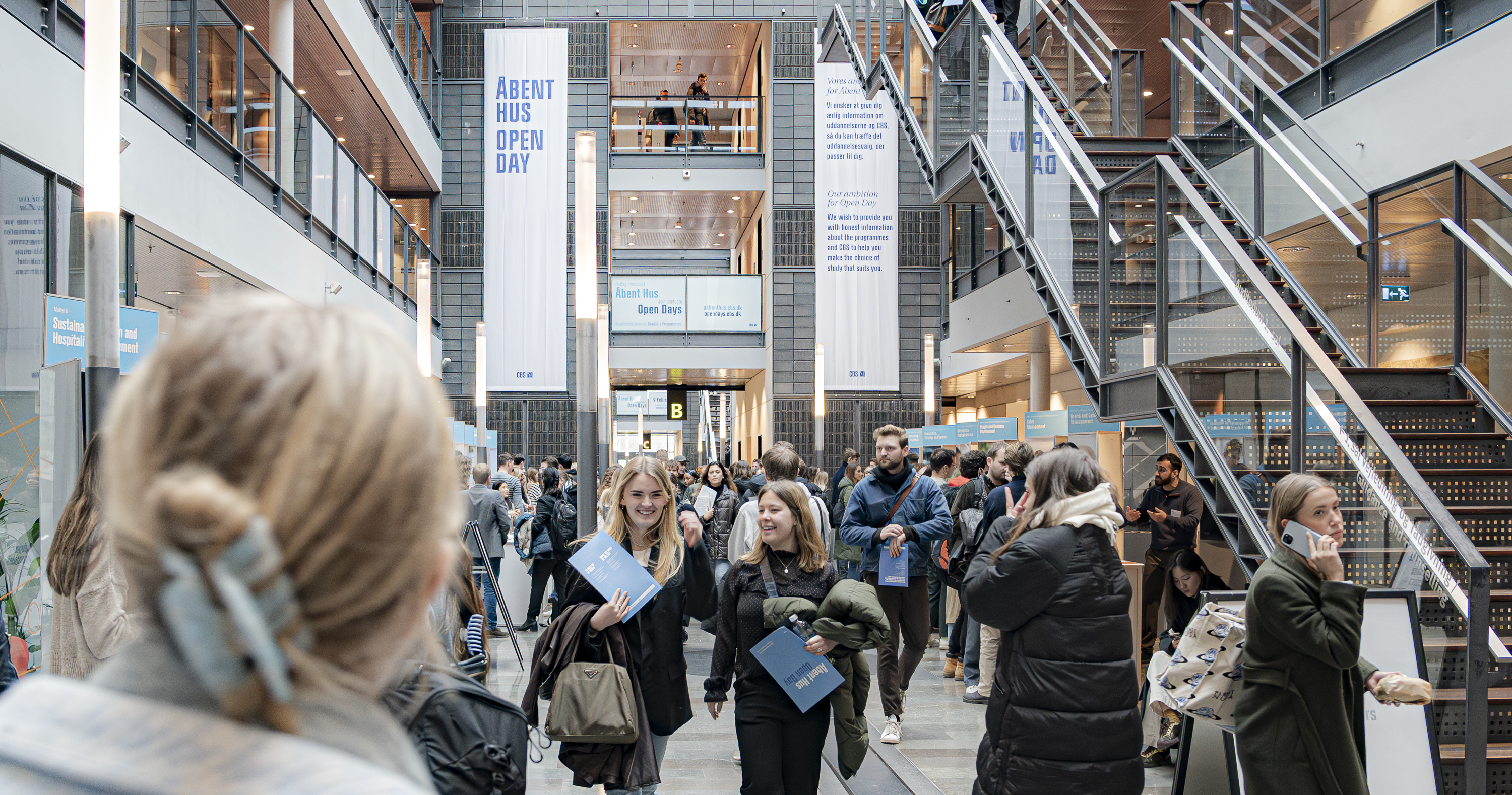MSc in Business Administration and Data Science
About the programme
Through a mix of theory and hands-on exercises you will learn to design, develop, implement, test and document technical business data analytics solutions to support organizational processes and/or satisfy business needs by using data analytics oriented programming languages (such as Python, R), Big data platforms (such as Hadoop, Spark) and open source technologies.
You will work with visual, text and predictive analytic techniques including latest methodologies from data mining, machine learning and deep learning in order to transform Big data sets into business assets.
You will understand the role of data analytics in the digital economy, and how companies can deal with the challenges and opportunities provided by the increasing availability of data, which is changing the business landscape. This will allow you to understand both the strategic and operational impact digitalization has on business innovation and strategy.
In combination with courses on visual analytics this will enable you to communicate across both the technical and the business side of business intelligence in both the development and presentation of solutions using business data analytics.
By working with the theoretical foundation as well as hands-on statistical analysis software packages (such as R. MATLAB, SAS) you will learn how to analyze and select the relevant method and model to perform predictive analysis and forecasting to produce fact based platforms for decision making.
Building on this foundation you will also learn about the international and national regulations and legislations for assessing and designing business data analytics solutions and products in accordance with the applicable legislation to ensure regulatory compliance and reflect on data ethics.
Customise your programme
During the programme, you have various opportunities to create your own academic profile.
Electives
On the 3rd semester, you can choose to study courses of your specific interest. CBS offers a large number of electives within a wide range of topics. You can also choose to take electives at other Danish universities. The electives you choose have to be relevant for your programme.
See the current selection of CBS electives on Single courses and electives - Master
Minor
On the 3rd semester, you can also choose to study a so-called minor. A minor is a package of electives within a specific academic area. Typically, it consists of 3 courses. By taking a minor, you strengthen your competences within a specific area of interest, and you can use it to qualify for specific jobs or industries.
See the current selection of CBS minors on Minors
Exchange
Many students choose to go on exchange on their 3rd semester; usually at one of CBS’ more than 300 partner universities. When you go on exchange through CBS, you do not have to pay for the teaching at the foreign university (with a few exceptions), and you can bring your SU (student grant).
Find a list of all CBS partner universities here
Academic internship
You can choose to replace some of your electives with a so-called academic internship. The academic internship consists of an internship period at a company, which is then completed with a project report. You can do the internship at a company in Denmark or abroad.
When doing an internship you get the opportunity to relate theory to practice and reflect on the academic training you receive at CBS in a practical setting. Therefore, the project report and work assignments during your internship have to be relevant to your study programme.
Master's thesis
Your 2nd year is completed with a master's thesis. You choose the topic you want to write about, which allows you to focus on a specific topic of your interest. Typically, you write your master's thesis with a fellow student.
What to consider
Studying in English
If you do not have bachelor’s degree taught in English, we recommend that you read more about what to consider before applying for an English taught programme.
Study environment
Student life at CBS
Studying at CBS is much more than just preparing for and going to classes.
At CBS, there are more than 20,000 students with different backgrounds and nationalities. Teamwork is an essential part of studying at CBS both in classes and in extracurricular activities.
With more than 100 student organisations, you also have plenty of opportunities to engage and connect with students across programmes and classes.
Learn more about the vibrant student life at CBS, the student organisations, and the international environment on Student life
For internationals
If you are an international student, we have gathered a lot of information about what it is like to be an international student at CBS and how you can prepare for life in Denmark.
Read more on For internationals
Teaching and exams
Teaching
The courses are a mix of lectures and exercises and you will have mandatory assignments throughout the semester.
Read more about Teaching and working methods on Student life
Exams
Read about Exams and exams types on Student life
Time consumption
You should know that it is demanding to study in a graduate programme, and both the curriculum and workload is significantly higher than at bachelor level.
If you are studying on a full-time graduate programme, you should expect spending approximately 37 hours on average on your studies each week. The workload will vary during the year.
The time leading up to assignment submissions and exams can be hectic, and you can easily work more than 40 hours a week in this period. Preparing for oral exams can be especially time consuming, because you have to be able to explain and discuss the covered concepts and theories and learn things by heart.
Read more about Time consumption on Student Life
Student job
Most programmes are quite flexible in terms of combining studies with a student job. Most students work a maximum of 15 hours a week in order to have sufficient time for their studies.
Studying in Denmark - for internationals
If this is your first time studying in Denmark, you may find teaching and exam formats, the grading scale and the academic calendar very different from what you are used to.
Read about everything you need to know as an international student studying at CBS on For internationals > Academic information
Career
What gets you the job?
Data Science graduates will accomplish a variety of skills in the domain of business data analytics, using knowledge and insights into practices within business data analytics, with a combination of data science, business, and public policy fields.
The interdisciplinary focus entails that graduates can develop and communicate scientifically rooted solutions, based on scientific techniques and methods within the data analytics, business and legal subjects. Graduates will master the methods, techniques and processes with a high scientific level within design, development, adoption, implementation, evaluation and exploitation of data science for business IT and economics.
You will be able to apply data mining and machine learning algorithms, methods, techniques, and tools to analyze, describe, and solve complex and interdisciplinary challenges by application of theories and frameworks, within both internal and external business data pipelines for organizations.
Career opportunities
You can perform specialist functions that requires knowledge and skills from the highest international research in data science and business issues, with an ability to box-in complex problems and take forward actions using data-driven decision making to support organizational strategies.
You will be able to facilitate and integrate data-driven decision making into organizational practices by acquiring, producing, and using new knowledge with data science and within new domain areas.
Competence profile
In the competence profile you can read more about the purpose of the programme and the competencies you achieve in the programme:
Competence profile for MSc in Business Administration and Data Science
Course overview
| 1st semester | 2nd semester | 3rd semester | 4th semester |
| Innovation and Strategy in the Digital Economy (7,5 ECTS) | Data Economics (7,5 ECTS) |
Electives / Internship / Exchange (30 ECTS)
|
|
| Datafication: Regulation, Governance, Security, Privacy and Ethics (7,5 ECTS) | Natural Language Processing and Text Analytics (7,5 ECTS) | ||
| Foundations of Data Science: Programming and Linear Algebra (7,5 ECTS) | Predictive Analytics (7,5 ECTS) | ||
| Data Management and Visualization (7,5 ECTS) | Machine Learning and Deep Learning (7,5 ECTS) |
You can read more about the programme, academic content and exams in the in the programme regulations for Data Science.


